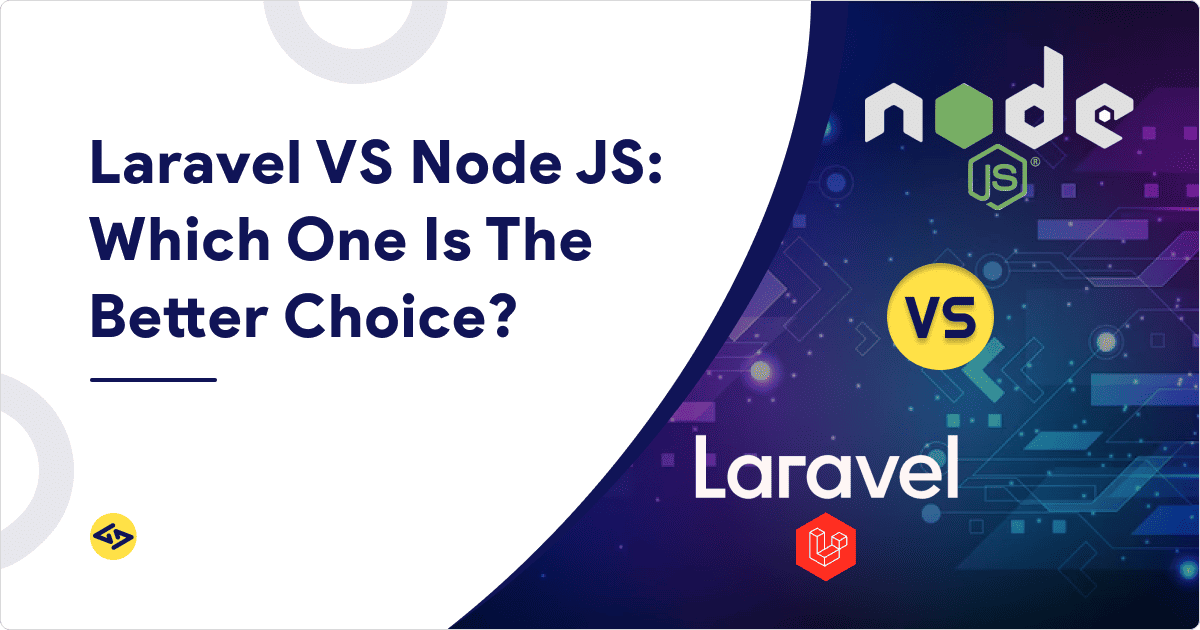Introduction: The Backend Technology Dilemma
Choosing between Laravel and Node.js is one of the most impactful technical decisions for developers and CTOs when building modern web applications. This decision influences everything from development speed and team productivity to long-term scalability and maintenance costs.
- Laravel is an elegant PHP framework, known for its expressive syntax and developer-friendly ecosystem.
- Node.js is not a framework or language but a JavaScript runtime environment, built on Chrome’s V8 engine, designed for event-driven, non-blocking I/O that powers fast, scalable applications.
Both technologies are widely adopted, but they approach backend development from fundamentally different philosophies.
This guide delivers a side-by-side Laravel vs Node.js comparison, covering fundamentals, features, pros and cons, performance benchmarks, scalability, developer experience, and real-world use cases — so you can make an informed decision.
Understanding the Fundamentals
What is Laravel?
Laravel is a PHP web application framework that follows the Model-View-Controller (MVC) pattern. Created by Taylor Otwell in 2011, Laravel has become the most popular PHP framework, widely appreciated for its clean syntax, robust feature set, and active community support.
Learn more about our Laravel Development Services.
What is Node.js?
Here’s where many blogs go wrong:
Node.js is not a programming language or framework.
It is a free, open-source JavaScript runtime environment that allows developers to run JavaScript code outside the browser. Built on Chrome’s V8 engine, Node.js is ideal for scalable, event-driven, real-time applications like chat apps, streaming platforms, and APIs.
Explore our Node.js Development Services.
Laravel: Features, Advantages, and Disadvantages
Key Features of Laravel
- MVC Architecture – Separates logic, UI, and data.
- Authentication System – Ready-to-use authentication scaffolding.
- Blade Templating Engine – Simplifies dynamic UI development.
- Security Features – Hashed passwords, CSRF protection, SQL injection prevention.
- Database Management – Migrations, Eloquent ORM, and schema version control.
Advantages of Laravel
- Rapid development with minimal boilerplate.
- Object-oriented libraries for authentication, routing, caching.
- Strong built-in security features.
- Excellent database handling with Eloquent ORM.
- Active community and ecosystem.
Disadvantages of Laravel
- Documentation sometimes lacks depth for edge cases.
- Not all external packages are fully compatible.
- Opinionated (convention over configuration) — can limit flexibility.
- Requires proper maintenance for maximum security.
- Learning curve for beginners new to PHP/MVC frameworks.
Node.js: Features, Advantages, and Disadvantages
Key Features of Node.js
- Asynchronous, Non-Blocking I/O – Handles multiple requests efficiently.
- JavaScript Everywhere – Same language for frontend and backend.
- Single-Threaded Event Loop – Lightweight and scalable.
- Cross-Platform Support – Works seamlessly on Windows, macOS, Linux.
Advantages of Node.js
- High performance (built on V8 engine).
- Handles concurrent requests efficiently.
- Massive NPM ecosystem (1.3M+ packages).
- Perfect for real-time apps (chat, collaboration, gaming).
- Backed by large companies (Netflix, PayPal, LinkedIn).
Need experts? Hire Node.js Developers from iCoderz to scale your project.
Disadvantages of Node.js
- Callback hell (though mitigated with async/await).
- Some packages are poorly maintained.
- Weak for CPU-heavy tasks like video rendering.
- API changes require frequent updates.
Laravel vs Node.js: Quick Comparison Table (2025)
| Feature | Laravel (PHP Framework) | Node.js (JavaScript Runtime) |
| Created | 2011 | 2009 |
| Category | Framework (PHP) | Runtime (JavaScript) |
| Execution Model | Synchronous | Asynchronous, Event-driven |
| Performance | Moderate | High |
| Templates | Blade Engine | Third-party (e.g., EJS, Handlebars) |
| Database Support | MySQL, PostgreSQL, SQLite, SQL Server | MongoDB, MySQL, PostgreSQL, Redis |
| Scalability | Scales via load balancing | Built-in clustering, microservices |
| Learning Curve | Easier for beginners | Steeper (async programming) |
| Community | Strong PHP ecosystem | Massive global JS ecosystem |
| Security | Strong built-in features | Depends on third-party modules |
| Best For | CMS, eCommerce, ERP apps | Real-time apps, APIs, microservices |
Performance & Scalability
- Node.js: Handles 10,000–15,000 requests/sec (ideal for I/O-heavy workloads).
- Laravel: Typically 2,000–5,000 requests/sec, but adequate for most apps when caching and optimization are applied.
Real-world insight: Performance depends more on database optimization and caching than framework choice.
Scalability
- Node.js: Excels with horizontal scaling & microservices.
- Laravel: Scales via load balancing and process management (PHP-FPM, Horizon).
Real-Time Features
- Node.js: Native support for WebSockets — perfect for chat apps, dashboards, IoT, multiplayer games.
- Laravel: Possible via Laravel WebSockets + Echo + Pusher, but requires more setup.
Developer Experience
Laravel
- Beginner-friendly.
- Convention over configuration → faster onboarding.
- Rich documentation, tutorials (Laracasts), and packages.
- Ideal for rapid MVP development.
Node.js
- Great for JavaScript developers.
- Requires understanding async programming.
- More freedom, but requires architectural decisions.
- Larger ecosystem, but package quality varies.
Salary Comparison (US Market)
- Laravel Developers: Avg. $92,000/year
- Node.js Developers: Avg. $114,000/year
Node.js has a salary edge due to demand in startups and real-time systems.
When to Choose Which?
Choose Laravel if:
- You’re building CMS, eCommerce, and SaaS dashboards.
- Team has PHP/MVC experience.
- You need rapid MVP development.
- Security & database management are top priorities.
Choose Node.js if:
- You’re building real-time, data-heavy, or microservice-based apps.
- Your team is strong in JavaScript.
- Scalability for high concurrency is crucial.
- You want one language (JS) across frontend + backend.
Hybrid Approaches
Many companies use both:
- Laravel for main app logic.
- Node.js for real-time microservices (chat, notifications, streaming).
Example: An enterprise using Laravel for order management + Node.js for live monitoring dashboards.
Conclusion: Laravel vs Node.js in 2025
- Node.js: Best for real-time apps, APIs, and scalability.
- Laravel: Best for business apps, CMS, eCommerce, and faster MVPs.
- Hybrid: Use both for maximum flexibility.
At iCoderz Solutions, we specialize in both Laravel and Node.js. Whether you need a secure business platform or a real-time scalable app, our expert teams deliver tailored solutions.
Contact us today to discuss your project and get a precise quote.
Need top-notch developers for your project? Our team delivers exceptional results.

Frequently Asked Questions (FAQs)
Q: Is Node.js faster than Laravel?
A: Node.js typically demonstrates superior raw performance for I/O-bound operations and can handle more concurrent connections. However, Laravel’s performance is entirely adequate for most web applications, and proper optimization (caching, database indexing) often matters more than framework choice for real-world applications.
Q: Which is easier to learn, Laravel or Node.js?
A: Laravel generally has a gentler learning curve due to its comprehensive documentation, sensible defaults, and “batteries included” approach. Node.js requires understanding asynchronous programming patterns and making more architectural decisions, which can be challenging for developers new to backend development.
Q: Can Laravel handle real-time applications?
A: Yes, Laravel can handle real-time features through Laravel WebSockets, Laravel Echo, and Pusher integration. However, Node.js provides native real-time capabilities and is the superior choice when real-time functionality is a core value proposition of your application.
Q: Which has better job prospects, Laravel or Node.js?
A: Both offer excellent career opportunities. Node.js developers currently command a slight premium (10-20%) in salaries and have more job openings in startup ecosystems. Laravel developers find strong demand in agencies and enterprise environments. Your choice should consider local market conditions and personal interest rather than purely salary potential.
Q: Do I need to know PHP to use Laravel?
A: Yes, Laravel is a PHP framework and requires PHP knowledge. However, Laravel’s expressive syntax makes PHP more enjoyable for many developers, and those with experience in other programming languages can learn PHP relatively quickly through Laravel’s excellent documentation.
Q: Can I use Laravel and Node.js together?
A: Absolutely. Many modern applications use hybrid architectures, leveraging Laravel for traditional web application features while using Node.js microservices for real-time functionality. This approach allows you to utilize each technology where it performs best.
Q: Which has better package availability, Laravel or Node.js?
A: Node.js has access to over 1.3 million NPM packages compared to Laravel’s 350,000 Composer packages. However, Laravel’s ecosystem emphasizes quality and framework integration, whereas NPM’s massive size includes many outdated or low-quality packages that require careful evaluation.
Q: Is Laravel or Node.js better for startups?
A: Laravel typically enables faster MVP development due to built-in features and rapid scaffolding. However, if your startup’s core value proposition involves real-time features or you have a JavaScript-focused team, Node.js may be a preferable choice. Consider your specific product requirements and team composition, rather than relying on blanket recommendations.



